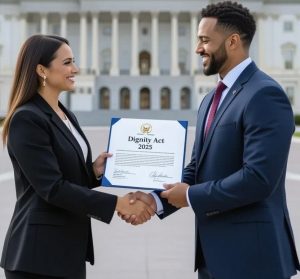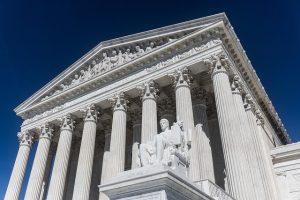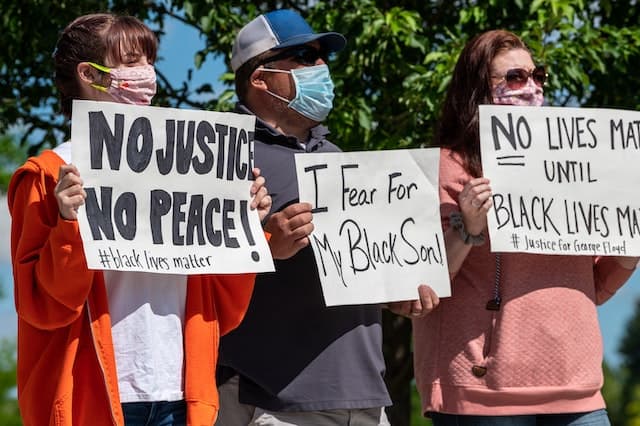Immigration Reform in 2025: What Lawmakers Are Debating and Why It Matters
 The U.S. foreign-born population hit a record 47.8 million in 2023. That number keeps climbing, putting pressure on an outdated immigration system last overhauled in 1996. Lawmakers in Congress now face heated debates over how to handle this reality. From border walls to legal pathways, the stakes feel higher than ever in 2025.
The U.S. foreign-born population hit a record 47.8 million in 2023. That number keeps climbing, putting pressure on an outdated immigration system last overhauled in 1996. Lawmakers in Congress now face heated debates over how to handle this reality. From border walls to legal pathways, the stakes feel higher than ever in 2025.
Proposals like the Dignity Act of 2025 aim to blend security with compassion. This bipartisan bill, reintroduced by Reps. Maria Elvira Salazar and Veronica Escobar, pushes for stronger borders while offering a seven-year renewable status to long-term undocumented residents. It sparks hope for families split by policy gaps. For many navigating these changes, firms like Escoto Law provide crucial guidance on what shifts mean day-to-day.
Key Proposals on the Table
Congress introduced several bills this year to tackle immigration head-on. The Dignity Act stands out as a comprehensive effort. It calls for physical barriers, advanced tech, and more personnel at the border. At the same time, it sets up a “Dignity Program” for those who have stayed in the country for more than five years. Participants would check in every two years, pay fees, and prove community ties to stay. After seven years, they could seek permanent status if borders prove secure.
- Border Security Boost: Funds for walls, sensors, and 100,000 new detention beds to speed up processing.
- Asylum Overhaul: Tougher fraud checks and faster hearings to cut backlogs that stretch years.
- Worker Visas Update: Recapture unused visas to ease shortages in tech and agriculture.
Not every idea wins broad support. The New Democrat Coalition’s framework adds smart tech investments and economic growth via legal labor. Yet, Republican-led bills like the American Tech Workforce Act tighten H-1B rules, aiming to protect U.S. jobs. These differences highlight a core tension: How much enforcement versus opportunity?
Political Positions: A Divided Landscape
Democrats often champion pathways to citizenship as a moral and economic win. They point to Dreamers, young adults brought here as kids, who now face uncertainty without reform. “We need to fix the broken asylum system and grow our workforce,” says Rep. Gabe Vasquez, a New Dem leader. His group pushes for fair enforcement without mass deportations, arguing it boosts GDP by $900 billion over a decade.
Republicans stress security first, viewing open borders as a crisis. With President Trump’s return, calls for mass deportations echo loudly. Project 2025, a conservative blueprint, urges slashing asylum access and ending birthright citizenship debates. “Secure the border, stop illegal immigration,” Rep. Salazar declares in bill texts. Supporters say this restores rule of law, but critics warn of family separations and court battles.
“The Dignity Act offers humanity and security in one package,” notes Rep. Escobar. “It restores dignity to those navigating a broken system for decades.”
Independents and moderates bridge the gap. Bipartisan talks, like those in the 2024 Senate deal, link funding to policy tweaks. Yet, progress stalls. Why? Partisan gridlock, fueled by election cycles, keeps bills bottled up. As one X post quipped recently, “Trump stopped the flow without a giant bill, proving enforcement works solo.” But data shows crossings dropped due to mixed factors, not miracles. Understanding these dynamics often starts with education, and resources like those from political science programs highlight how studying policy equips advocates to shape balanced solutions.
Potential Legal Consequences: Wins and Risks
New laws could reshape lives overnight. A citizenship path might legalize 11 million undocumented folks, easing fears of raids. Families could reunite without visa lotteries. Economies in states like California and Texas, where immigrants are one in five residents, would thrive with stable workers.
But pitfalls loom large. Stricter asylum rules risk violating international treaties, inviting lawsuits. Mass deportations? They’d cost $170 billion, per Brookings estimates, and clog courts. Immigration judges already face 3 million case backlogs. “Rushed policies lead to chaos,” warns a recent AILA report. Plus, ending programs like TPS strands long-term residents in limbo.
- Positive Shifts: Faster green cards reduce family separations and boost tax revenues.
- Legal Hurdles: Challenges under the 14th Amendment could halt birthright changes.
- Economic Hits: Deporting workers empties farms and factories, hiking food prices.
Attorneys see ripple effects everywhere. High-skilled reforms, like the H-1B tweaks, might flood tech with talent but squeeze American grads. “Clients worry about unintended bars to status,” shares an expert from Reddy Neumann Brown PC. Balanced views, they say, prevent a system that punishes the vulnerable while ignoring real threats.
Why It All Matters: Beyond the Beltway
Immigration touches every corner of American life. Think of the nurse from Mexico staffing your ER or the engineer from India coding your apps. Reforms decide if they stay contributors or forced exiles. In 2025, with crossings at decade lows yet tensions high, getting this right builds trust. Wrong moves? They deepen divides, fuel protests, and drain budgets.
Communities crave clarity. A Texas farmer told El Paso Times reporters, “We need hands to harvest—deport them, and crops rot.” On X, users debate fiercely: One viral thread praised enforcement wins; another mourned “hunting Latinos in their beds.” Facts cut through noise, reform could add jobs, cut deficits, and honor Dreamers’ grit.
As debates rage, one truth stands. Immigration reform in 2025 isn’t just policy. It’s about weaving newcomers into our story without tearing the fabric. Will Congress choose division or dignity? The answer shapes tomorrow. For those caught in the crossfire, trusted voices like Escoto Law remind us: Knowledge empowers amid uncertainty. Let’s push for laws that lift all boats.








 Our government has a fundamental obligation to guarantee the security and excellence of LED products. To safeguard buyers from dangerous or defective goods, rules and regulations are crucial. Governments strive for market integrity by halting the spread of low-quality or counterfeit LED products that endanger consumers and impede honest competition.
Our government has a fundamental obligation to guarantee the security and excellence of LED products. To safeguard buyers from dangerous or defective goods, rules and regulations are crucial. Governments strive for market integrity by halting the spread of low-quality or counterfeit LED products that endanger consumers and impede honest competition. Republican House members Senator JD Vance (Ohio) and Representative Michael Cloud (Texas) together with several other Republican lawmakers have introduced a bill known as the Dismantle DEI Act. The acronym DEI stands for diversity, equity and inclusion, which Republicans say are the specific factors that Pres. Joe Biden has disproportionately integrated in his administration. The Republican lawmakers oppose the programs and policies being carried out by every federal agency in the US, since they are chiefly for the purpose of advancing socialism in the country.
Republican House members Senator JD Vance (Ohio) and Representative Michael Cloud (Texas) together with several other Republican lawmakers have introduced a bill known as the Dismantle DEI Act. The acronym DEI stands for diversity, equity and inclusion, which Republicans say are the specific factors that Pres. Joe Biden has disproportionately integrated in his administration. The Republican lawmakers oppose the programs and policies being carried out by every federal agency in the US, since they are chiefly for the purpose of advancing socialism in the country. ocialism images in russiaPassing the anti-DEI legislation will prevent the federal government from awarding contracts to defense, construction, aerospace and other industries that favor DEI practices. Moreover, implementing the Dismantle DEI Act will bar the awarding of federal grants to recipients across energy, medical and other industries, being used to carry out programs that follow DEI principles.
ocialism images in russiaPassing the anti-DEI legislation will prevent the federal government from awarding contracts to defense, construction, aerospace and other industries that favor DEI practices. Moreover, implementing the Dismantle DEI Act will bar the awarding of federal grants to recipients across energy, medical and other industries, being used to carry out programs that follow DEI principles. Antisemitism continues to charge the global political and social climates after Israel responded with indiscriminate and intensified responses to the Hamas attacks in Gaza Strip last October 07. As Hamas terrorists had killed 1,400 civilians and taken 240 hostages who were mostly Israelis, the subsequent incidents of indiscriminate and intense violence directed at Palestinian communities led to heightened feelings of fear among the Jewish people.
Antisemitism continues to charge the global political and social climates after Israel responded with indiscriminate and intensified responses to the Hamas attacks in Gaza Strip last October 07. As Hamas terrorists had killed 1,400 civilians and taken 240 hostages who were mostly Israelis, the subsequent incidents of indiscriminate and intense violence directed at Palestinian communities led to heightened feelings of fear among the Jewish people. Antisemitism is a feeling of hostility and hatred that stems from prejudicial sentiments or discrimination against the Jewish race. A person who harbors this kind of deep hatred for Jews is called an antisemite.
Antisemitism is a feeling of hostility and hatred that stems from prejudicial sentiments or discrimination against the Jewish race. A person who harbors this kind of deep hatred for Jews is called an antisemite.

 Wyoming Republican Rep. Liz Cheney who serves as Vice Chair of the House January 6 Committee said that Trump might actually
Wyoming Republican Rep. Liz Cheney who serves as Vice Chair of the House January 6 Committee said that Trump might actually  Trump has until Friday to furnish information that will shed light on his alleged participation in supporting the January 06 Capitol Hills riot.
Trump has until Friday to furnish information that will shed light on his alleged participation in supporting the January 06 Capitol Hills riot.



 On a Friday night in Seoul’s Gangnam district, the streets glow with neon and the sound of music spills out from karaoke rooms tucked between sleek bars and rooftop lounges. For many, a night of singing with friends is a way to celebrate the week’s end. But behind each private booth and high-end sound system lies a complex story about 강남가라오케 가격, economics, regulation, and the city’s evolving sense of value.
On a Friday night in Seoul’s Gangnam district, the streets glow with neon and the sound of music spills out from karaoke rooms tucked between sleek bars and rooftop lounges. For many, a night of singing with friends is a way to celebrate the week’s end. But behind each private booth and high-end sound system lies a complex story about 강남가라오케 가격, economics, regulation, and the city’s evolving sense of value. Seoul’s nightlife has long been more than a stage for music, cocktails, and luxury indulgence. For decades, certain elite spaces in districts like Gangnam have doubled as informal arenas where political figures, business tycoons, and cultural influencers gather away from the public eye. These private clubs and lounges are not just about champagne and neon lights; they are often settings for negotiations, power plays, and whispered deals that shape the course of Korean society.
Seoul’s nightlife has long been more than a stage for music, cocktails, and luxury indulgence. For decades, certain elite spaces in districts like Gangnam have doubled as informal arenas where political figures, business tycoons, and cultural influencers gather away from the public eye. These private clubs and lounges are not just about champagne and neon lights; they are often settings for negotiations, power plays, and whispered deals that shape the course of Korean society.
 Political disengagement does not exempt anyone from the implications of leadership choices—just makes them unwitting recipients. Camouflaging ourselves with information and dialogue isn’t about concealing; it’s about maintaining our capacity to respond with reason.
Political disengagement does not exempt anyone from the implications of leadership choices—just makes them unwitting recipients. Camouflaging ourselves with information and dialogue isn’t about concealing; it’s about maintaining our capacity to respond with reason. From parameters to presidential offices, political environments’ illumination is typically symbolic. While more modern, simple lighting can represent progressiveness and innovation, grand chandeliers and soaring ceilings can communicate power and heritage. These areas’ lighting decisions are taken with thought to mirror the political system they depict’s principles and aspirations.
From parameters to presidential offices, political environments’ illumination is typically symbolic. While more modern, simple lighting can represent progressiveness and innovation, grand chandeliers and soaring ceilings can communicate power and heritage. These areas’ lighting decisions are taken with thought to mirror the political system they depict’s principles and aspirations. Both federal and state regulations influence horse float safety standards. The specific laws may vary depending on the location, but they all aim to ensure that horse floats meet specific safety benchmarks. These standards cover various aspects, including weight distribution, structural strength, braking systems, and how the float is hitched to the towing vehicle. Horse owners must consider these regulations when buying a horse float.
Both federal and state regulations influence horse float safety standards. The specific laws may vary depending on the location, but they all aim to ensure that horse floats meet specific safety benchmarks. These standards cover various aspects, including weight distribution, structural strength, braking systems, and how the float is hitched to the towing vehicle. Horse owners must consider these regulations when buying a horse float. Trade policies greatly influence the wholesale buying of electrical and plumbing products. Negotiating trade deals helps politicians lower import taxes on these goods, lowering their costs for consumers and companies. These agreements can also open domestic producers’ new markets, increasing exports and economic development.
Trade policies greatly influence the wholesale buying of electrical and plumbing products. Negotiating trade deals helps politicians lower import taxes on these goods, lowering their costs for consumers and companies. These agreements can also open domestic producers’ new markets, increasing exports and economic development.



 The Ultimate Guide to Furniture Removals in Frankston
The Ultimate Guide to Furniture Removals in Frankston

 Glass panels have become a symbol of transparency and openness, conveying a sense of accessibility and accountability to the public. However, the use of glass in political buildings also raises important security concerns, particularly in an era where threats to public safety are increasingly unpredictable. This article explores the delicate balance between aesthetics and security in the incorporation of glass panels in political structures, and how architects and security experts navigate these challenges.
Glass panels have become a symbol of transparency and openness, conveying a sense of accessibility and accountability to the public. However, the use of glass in political buildings also raises important security concerns, particularly in an era where threats to public safety are increasingly unpredictable. This article explores the delicate balance between aesthetics and security in the incorporation of glass panels in political structures, and how architects and security experts navigate these challenges. When discussing yachts, many envision luxury, relaxation, and open seas. However, the yachting experience is heavily influenced by government rules and regulations. These regulations ensure safety, protect the environment, and maintain fair use of waterways by yachts.
When discussing yachts, many envision luxury, relaxation, and open seas. However, the yachting experience is heavily influenced by government rules and regulations. These regulations ensure safety, protect the environment, and maintain fair use of waterways by yachts.



 In today’s fast-paced, digitally driven world, it seems like we’re constantly being pulled in different directions. The polarization in the political landscape can often feel overwhelming, with divides deepening on a daily basis. Yet, there lies simple pickleball, seemingly mundane yet incredibly effective in bridging gaps and fostering community.
In today’s fast-paced, digitally driven world, it seems like we’re constantly being pulled in different directions. The polarization in the political landscape can often feel overwhelming, with divides deepening on a daily basis. Yet, there lies simple pickleball, seemingly mundane yet incredibly effective in bridging gaps and fostering community.